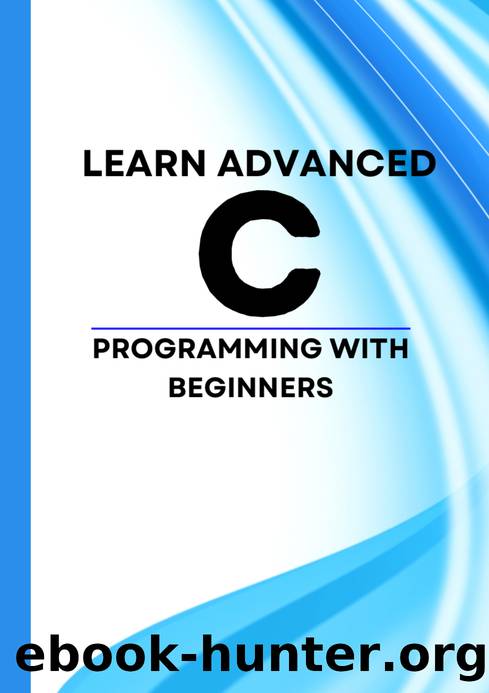Learn Advanced C Programming with Beginners: We have prepared this book with live coding examples, so that you can easily learn C programming. by Pulok Md

Author:Pulok, Md
Language: eng
Format: epub
Published: 2024-01-15T00:00:00+00:00
4.Void Pointers: void pointers (void *) are a special type of pointer that can point to data of any type.
They are often used in generic programming to handle different data types using the same pointer.
5.Pointer to Pointers (Double Pointers):
Pointers can themselves have pointers, forming a chain of indirection. Double pointers (int **pptr;) can point to pointers (int *ptr;), which, in turn, point to data.
6.Pointer to Structures:
Pointers are used to work with structures, allowing for efficient access to structure members and dynamic allocation of structures.
7.Function Return Types:
Functions in C can return pointers, providing a way to return dynamically allocated memory or the address of a variable.
8.Secure Coding Practices:
Pointers require careful handling to prevent issues like dangling pointers, memory leaks, and undefined behavior. Proper memory management and validation are crucial.
9.Pointer Casting:
Pointers can be cast from one type to another using explicit type casting. This is often done when working with different data types.
Understanding pointers is essential for efficient memory management, data manipulation, and advanced programming in C. Pointers provide a level of control over memory that is not possible with regular variables, allowing for dynamic memory allocation, efficient array manipulation, and the creation of complex data structures.
In C, a pointer is a variable that stores the memory address of another variable. Pointers are powerful and flexible, allowing for dynamic memory allocation and manipulation. Here's a coding example to illustrate the concept of pointers in C:
#include <stdio.h>
int main() {
// Declare a variable and a pointer int number = 42; int *ptr;
// Assign the address of 'number' to the pointer ptr = &number;
// Display the value and memory address using both variable and pointer
printf("Value of 'number': %d
", number);
printf("Memory address of 'number': %p
", (void*)&number);
printf("
Value using pointer: %d
", *ptr); printf("Memory address stored in pointer: %p
", (void*)ptr);
// Modify the value through the pointer *ptr = 99;
// Display the modified value using both variable and pointer printf("
Modified value of 'number': %d
", number); printf("Modified value using pointer: %d
", *ptr);
return 0;
}
Now, let's break down what pointers specifically mean in C:
Download
This site does not store any files on its server. We only index and link to content provided by other sites. Please contact the content providers to delete copyright contents if any and email us, we'll remove relevant links or contents immediately.
| Ajax | Assembly Language Programming |
| Borland Delphi | C & C++ |
| C# | CSS |
| Compiler Design | Compilers |
| DHTML | Debugging |
| Delphi | Fortran |
| Java | Lisp |
| Perl | Prolog |
| Python | RPG |
| Ruby | Swift |
| Visual Basic | XHTML |
| XML | XSL |
The Mikado Method by Ola Ellnestam Daniel Brolund(22121)
Hello! Python by Anthony Briggs(21328)
Secrets of the JavaScript Ninja by John Resig Bear Bibeault(19848)
Dependency Injection in .NET by Mark Seemann(19302)
The Well-Grounded Java Developer by Benjamin J. Evans Martijn Verburg(19009)
Kotlin in Action by Dmitry Jemerov(18891)
OCA Java SE 8 Programmer I Certification Guide by Mala Gupta(18503)
Algorithms of the Intelligent Web by Haralambos Marmanis;Dmitry Babenko(17347)
Adobe Camera Raw For Digital Photographers Only by Rob Sheppard(16957)
Grails in Action by Glen Smith Peter Ledbrook(16488)
Test-Driven iOS Development with Swift 4 by Dominik Hauser(10799)
Becoming a Dynamics 365 Finance and Supply Chain Solution Architect by Brent Dawson(8063)
Microservices with Go by Alexander Shuiskov(7827)
Practical Design Patterns for Java Developers by Miroslav Wengner(7729)
Test Automation Engineering Handbook by Manikandan Sambamurthy(7687)
Angular Projects - Third Edition by Aristeidis Bampakos(7173)
The Art of Crafting User Stories by The Art of Crafting User Stories(6620)
NetSuite for Consultants - Second Edition by Peter Ries(6542)
Demystifying Cryptography with OpenSSL 3.0 by Alexei Khlebnikov(6312)
